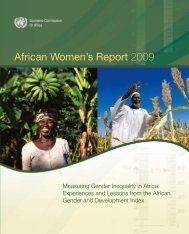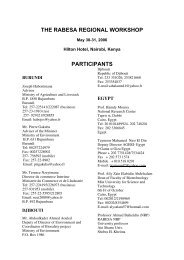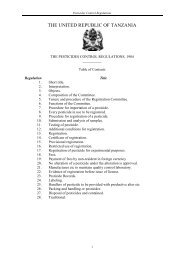Community-driven development decision tools for rural - IFAD
Community-driven development decision tools for rural - IFAD
Community-driven development decision tools for rural - IFAD
- No tags were found...
Create successful ePaper yourself
Turn your PDF publications into a flip-book with our unique Google optimized e-Paper software.
6. Government agencies delegated to provide public utilities (e.g. water supply, power andcommunications) operate commercial enterprises. These enterprises are entitled to retain thenon-fiscal revenue of their operations, government funds transferred to them to subsidize theproduction of goods and services (when this is government policy) and the assets createdwith the initial government grant and funds raised in the capital market.7. Other <strong>for</strong>ms of delegation imply contractual arrangements between government andindependent agencies of the public, private or voluntary sector, whereby the agent per<strong>for</strong>msspecific public functions in exchange <strong>for</strong> an agreed amount of money. For example, an NGOcan be delegated to implement one or several components of a <strong>rural</strong> <strong>development</strong> project.Contracts may be <strong>for</strong> one year or longer and the contractor is required to obtain approval ofits annual budgets from the delegating authority. The treasury makes payments to thedelegated agent in accordance with procedures agreed upon in the contract.8. De-concentration of the public administration implies only some changes in procedures,such as the appointments of accounting officers at the local level (e.g. the District AgriculturalOfficer, responsible <strong>for</strong> the de-concentrated unit of the ministry of agriculture at the districtlevel) and the establishment of a local officer of the treasury (e.g. the Sub-Accountant).Whereas the budget of the de-concentrated unit is approved at the central level and includedin the budget vote, the corresponding AIEs are not issued by the CAO of the ministry (i.e.generally the Principal Secretary); they are issued directly by the treasury to the localaccounting officer. Payment vouchers issued by the accounting officer under the AIE arehonored locally by the Sub-Accountant. 459. Devolution implies more significant changes, including the elimination of the principle ofUCCA. Local governments are given authority to raise and retain local fiscal and non-fiscalrevenue, the local part of AIA and private donations that fund activities within the domain ofthe local government. 46 Local governments in poor countries have very limited capacity toraise revenue <strong>for</strong> a variety of reasons, including the following:• a very poor tax basis;• reluctance of local politicians to introduce unpopular measures that tax their electors;• difficulty en<strong>for</strong>cing revenue collection due to low confidence of tax payers that the moneywill be put to good use;• the belief that the “rich” central government should pay <strong>for</strong> the services provided by thelocal administration.10. Devolution policies transfer responsibilities to local governments which have insufficientresources to carry them out. This generates a fiscal gap, which is filled by the centralgovernment transferring funds from the treasury to the local governments. This is done usingan instrument called an Inter-Governmental Financial Transfer (IGFT). In poor countries,IGFTs represent by far the largest share of the local government budget, but in some casesprivate donations may represent a very important contribution that is much too oftenunderestimated and undervalued in small countries.11. IGFTs may transfer financial resources as a lump sum or as a matching grant. Lump sumgrants can be unconditional or conditional; they are unconditional when the receiver is free45 Normally, these arrangements do not concern payment of salaries to the staff of deconcentrated units, which are handleddirectly by the treasury.46 Under special circumstances (e.g. demonstrated capacity to raise fiscal revenue), local governments may also be allowed toraise loans in the capital market.87
















